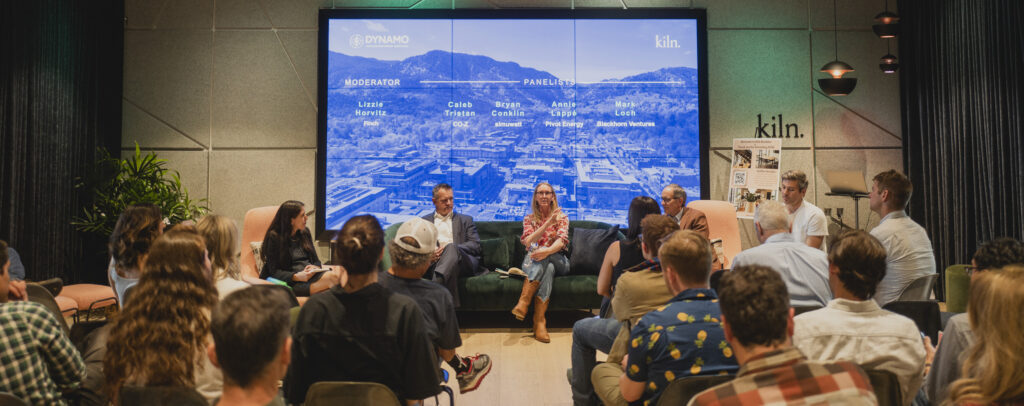

Innovation in the Rockies: Spotlight on Colorado CleanTechs
Thursday, May 18th 2023On Tuesday May 16th, Dynamo participated in Boulder Startup Week for the first time with our space partner in Boulder, Kiln. The event, Innovation in the Rockies: Spotlight on Colorado Cleantechs amplified founders, investors, and leaders at some of the most game-changing clean techs in the Rocky Mountain State.
Tim Morrissey, Co-Founder & CEO at Artimus Robotics, welcomed the crowd to Boulder Startup Week and introduced Nina Khorsavi, Community Director at Kiln. Nina remarked that Dynamo and Kiln have been space partners for 8 months, fostering and maintaining a mutually beneficial relationship for members.
Nina turned it over to Kacy Cox, Director of Partnerships at Dynamo Energy Hub who gave an overview of what Dynamo is and how Dynamo facilitates the clean energy transition ‘by bringing everyone together for events like this.”
The evening’s panel kicked off with moderator Lizzie Horvitz, Founder & CEO at Finch asking the cleantech group to introduce themselves.
- Caleb Tristan, CEO at CO-Z, a startup that builds plug and play energy storage
- Mark Loch, Operating Partner at Blackhorn Ventures, an early-stage venture fund that invests in transformative companies
- Annie Lappé, Vice President of Policy & Impact at Pivot Energy, a cleantech that owns, develops, and operates distributed generation solar
- Bryan Conklin, CEO & President at simuwatt, a cleantech that produces an energy efficiency software platform called buildee
Bryan tackled Lizzie’s first question on what the biggest challenges are facing clean tech right now. For simuwatt, a cleantech that serves the built environment, the biggest challenge lies in the economy and worries around an impending recession, causing building owners to be reluctant to put capital into their buildings. Bryan admits that although fixing the economical aspect is challenging, we can keep the pressure on the compliance programs and consider a carbon tax.
From Annie’s perspective in the solar landscape, she believes permitting issues that can stem from disinformation is a serious issue hindering advancements. “Even if we get renewable energy policies at the state and federal level, we can’t get these projects actually permitted at the local level,” Annie explained.
Jumping off Annie’s point, Mark emphasized that within Blackhorn Ventures’ portfolio, they have seen cleantechs get stuck in the pilot to scaling phase. Mark’s advice was for cleantechs to ensure that their pilots have clear timelines, budgets, and deliverables to avoid “death by pilot”.
For Caleb, the biggest challenge is focusing on the education of the end user customer. The public should understand why they should want to have solar on a home or why they should be buying electric vehicles.
Lizzie’s next question looked at the shifting market dynamics, its effects on the ability to fundraise, and how living in Colorado has helped or impacted that. Mark touched specifically on SVB’s failure and how it made people very cautious, asking questions they weren’t even thinking about beforehand. He also noted how the bank’s collapse resulted in an evaluation reset—or in his words, an evaluation normalization—which can be a healthy dynamic that gets the conservation about what you need to get to the next round.
CO-Z has gone through numerous rounds of investments and Caleb mentioned how raising money used to be a lot easier pre-covid, especially in Boulder. The strongest aspect of Colorado, Caleb believes, is the community that has supported CO-Z and other cleantechs to survive. Mark remains optimistic about the future, reiterating Caleb’s point that the Colorado community has massive funding with now a very supportive government
Then Lizzie asked for current trends in cleantech space and what people are excited about in the next year. The drive towards equity focused renewable energy procurement coming from corporates is very exciting for Pivot Energy, an impact-oriented company. Annie explained how the dream is to develop projects that you can sell to a corporate off taker so you can build an impact into your project.
From the built environment perspective, Bryan noted how “if you’re not being sustainable, you’re not using our capital.” For example, large property owners are putting carbon reduction goals on their buildings. Money matters and according to Bryan, it will create the scale and make it more adjustable.
After the rich panel discussion, Lizzie opened the floor to questions from the audience for an informative and engaging Q&A session before attendees broke for the Happy Hour. We’re grateful for the insights from our thought-provoking panelists and moderator. Colorado cleantechs will prove to be important players on the road to decarbonization and Dynamo’s hubs in Boulder and Denver will be ideal homes for the next great idea.
For media relations contact
Claudia Prandoni Marketing & Communications Manager